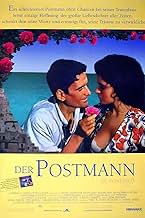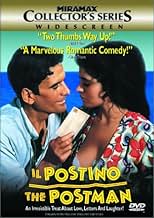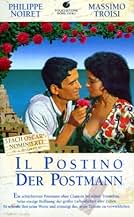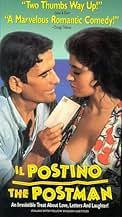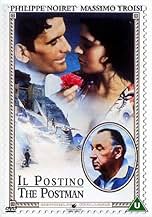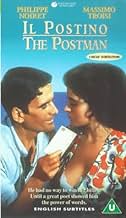CALIFICACIÓN DE IMDb
7.8/10
41 k
TU CALIFICACIÓN
Un sencillo cartero italiano aprende a amar la poesía mientras se encarga de llevar el correo a un famoso poeta, y la usa para conquistar a Beatriz, una belleza de la localidad.Un sencillo cartero italiano aprende a amar la poesía mientras se encarga de llevar el correo a un famoso poeta, y la usa para conquistar a Beatriz, una belleza de la localidad.Un sencillo cartero italiano aprende a amar la poesía mientras se encarga de llevar el correo a un famoso poeta, y la usa para conquistar a Beatriz, una belleza de la localidad.
- Dirección
- Guionistas
- Elenco
- Ganó 1 premio Óscar
- 31 premios ganados y 20 nominaciones en total
Calogero Azzaretto
- Bookseller
- (sin créditos)
Simona Caparrini
- Elsa Morante
- (sin créditos)
Angelo Casadei
- Cinema Spectator
- (sin créditos)
Chuck Riley
- Narrator of Theatrical Trailer
- (voz)
- (sin créditos)
Opiniones destacadas
Although "Il Postino" simply means "The Postman", and although the film was at one time screened as "The Postman" in Britain, it is now generally known in English by its Italian title to avoid confusion with Kevin Costner's post-apocalyptic epic from three years later. It is loosely based upon the novel "Ardiente paciencia" by the Chilean writer Antonio Skármeta, although it transfers the action from Chile to Italy. It takes as its starting-point the fact that in the early 1950s the famous Chilean poet Pablo Neruda, in exile from his homeland for political reasons, spent some time on the island of Capri. The film, however, is not set on Capri but on an unnamed Italian island.
A young fisherman named Mario Ruoppolo applies for a job as the island's postman. As he owns a bicycle and is one of the very few islanders who can read and write he is accepted and is told that he will only have one customer, Neruda himself, as because of the low levels of literacy on the island nobody else ever receives any mail. (Were standards of education really so low in fifties Italy?)
Although Mario has never previously heard of Neruda, and certainly has never read any of his poems, a friendship gradually grows up between the two men. Although Mario has had little formal education he is clearly an intelligent and sensitive man, and Neruda reads him some of his poetry (in Italian translation), teaching him about literary concepts such as metaphors. With Neruda's help Mario woos the beautiful Beatrice, a village girl with whom he has fallen in love, stealing some of the older man's love poems and passing them off as his own in order to win her affections.
My one criticism of the film would be that it is too sentimental about Communism, but that is perhaps only to be expected of a film from Italy, a country which at one time had the largest Communist Party in Western Europe. (In the seventies they used to win around a third of the popular vote, at a time when the British Communist Party generally consisted of three old men and a dog). Pablo Neruda is here portrayed as a kindly, idealistic gentleman, but in reality, during the forties and early fifties, he was a Communist hardliner who enthusiastically defended Stalin's dictatorship in the Soviet Union. After Khrushchev's 1956 "secret speech" he was to criticise the Stalinist cult of personality but this was due less to a change of heart than to a desire to align himself with the new official Soviet party line. He was also, at the time of his Italian exile, around twenty years younger than the character portrayed here by Philippe Noiret.
Its politics aside, however, "Il Postino" is in many ways an excellent film. There is some attractive photography of the Italian coastal scenery and a great musical score by Luis Enríquez Bacalov. What really makes the film stand out, however, are the two great performances from Noiret and from Massimo Troisi, who tragically died of a heart attack soon afterwards, as Mario. There is also a good performance from the lovely Maria Grazia Cucinotta as Beatrice. Troisi received a posthumous Oscar nomination for "Best Actor", but lost out to Nicholas Cage in "Leaving Las Vegas"; as I have never seen that film I am unable to comment on the justice of that decision. I felt, however, that it was unfortunate that there was no nomination for Noiret either as "Best Actor" or "Best Supporting Actor". Indeed, this is one of those films which make me feel that it should be possible to nominate two actors for a joint award, as Noiret and Troisi combine together so well that their joint contribution seems greater than the sum of its two parts. This is the story of a touching relationship between two men of different generations, of different nationalities, of different levels of education and of different outlooks on life who are nevertheless united in friendship. 8/10
A young fisherman named Mario Ruoppolo applies for a job as the island's postman. As he owns a bicycle and is one of the very few islanders who can read and write he is accepted and is told that he will only have one customer, Neruda himself, as because of the low levels of literacy on the island nobody else ever receives any mail. (Were standards of education really so low in fifties Italy?)
Although Mario has never previously heard of Neruda, and certainly has never read any of his poems, a friendship gradually grows up between the two men. Although Mario has had little formal education he is clearly an intelligent and sensitive man, and Neruda reads him some of his poetry (in Italian translation), teaching him about literary concepts such as metaphors. With Neruda's help Mario woos the beautiful Beatrice, a village girl with whom he has fallen in love, stealing some of the older man's love poems and passing them off as his own in order to win her affections.
My one criticism of the film would be that it is too sentimental about Communism, but that is perhaps only to be expected of a film from Italy, a country which at one time had the largest Communist Party in Western Europe. (In the seventies they used to win around a third of the popular vote, at a time when the British Communist Party generally consisted of three old men and a dog). Pablo Neruda is here portrayed as a kindly, idealistic gentleman, but in reality, during the forties and early fifties, he was a Communist hardliner who enthusiastically defended Stalin's dictatorship in the Soviet Union. After Khrushchev's 1956 "secret speech" he was to criticise the Stalinist cult of personality but this was due less to a change of heart than to a desire to align himself with the new official Soviet party line. He was also, at the time of his Italian exile, around twenty years younger than the character portrayed here by Philippe Noiret.
Its politics aside, however, "Il Postino" is in many ways an excellent film. There is some attractive photography of the Italian coastal scenery and a great musical score by Luis Enríquez Bacalov. What really makes the film stand out, however, are the two great performances from Noiret and from Massimo Troisi, who tragically died of a heart attack soon afterwards, as Mario. There is also a good performance from the lovely Maria Grazia Cucinotta as Beatrice. Troisi received a posthumous Oscar nomination for "Best Actor", but lost out to Nicholas Cage in "Leaving Las Vegas"; as I have never seen that film I am unable to comment on the justice of that decision. I felt, however, that it was unfortunate that there was no nomination for Noiret either as "Best Actor" or "Best Supporting Actor". Indeed, this is one of those films which make me feel that it should be possible to nominate two actors for a joint award, as Noiret and Troisi combine together so well that their joint contribution seems greater than the sum of its two parts. This is the story of a touching relationship between two men of different generations, of different nationalities, of different levels of education and of different outlooks on life who are nevertheless united in friendship. 8/10
I've never seen him in anything else, but this performance by Massimo Troisi touches my soul. Stunning.
A beautiful movie that does an excellent job bringing to life Neruda's love poems and how they touch the life of a simpleton postman. It inspires in one, a spiritual and sensual love for poetry. The music is intricately woven into the fabric of the story, and is surely a high point in the movie. Great cinematography, matched frame by frame with the splendid acting, especially that of Massimo Troisi and Philippe Noiret. Watch this movie if you are disillusioned with the notion of romance, and need some succour.
The movie once again reinforces my admiration for the Italian film-makers. What amazes me is their simplicity in relating a tale, and how subtly pathos is displayed in their movies. This is also evidenced in "Life is Beautiful" and "The Bicycle Thief".
The movie once again reinforces my admiration for the Italian film-makers. What amazes me is their simplicity in relating a tale, and how subtly pathos is displayed in their movies. This is also evidenced in "Life is Beautiful" and "The Bicycle Thief".
"Il Postino" is a movie that received oodles of critical acclaim upon its release in 1994. While I don't think it was as good as advertised, I understand why it received such praise. In a movie world that is filled with dry and unamusing romance stories, "Il Postino" is a relatively lush and beautiful tale.
The plot is fairly simple but loaded with subtleties that allow, even encourage, multiple viewings. Mario (Massimo Troisi) longs for something more than his simple fisherman life on an Italian island, so he takes a small job as a postman, delivering mail to famed romantic poet Pablo Neruda (Phillipe Noiret), who is living in exile on the same island. Over time, they develop a relationship that is based on Neruda aiding Mario in wooing his beloved Beatrice (Maria Grazia Cucinotta).
The final act is where the film makes the leap from well-made standard fare to something greater. With a couple plausible plot developments, characters and relationships are deepened beyond a basic love story, to a place that accents everything that happens leading up to that point. I can't say much else without giving things away, but stick with the movie to the end, even if you're dragging midway through.
As you might expect from an Italian film, "Il Postino" has a very European feel. The passion of Italy is present throughout, explained through lifestyles, literal and metaphorical imagery, and the emotions of the characters. The setting is far from the bustling dollar-driven society in which Americans dwell, and a movie like this wouldn't get made in America, because the cultures are drastically different.
The film's star, Massimo Troisi, is excellent. He embodies everyman qualities exceptionally, similar to Tom Hanks, yet with more...something. Soul perhaps? He, like the entire film, is just more European, and I hope you understand what I mean by that. Noiret portrays Neruda perfectly, expressing his romantic ways through both words and actions. Everyone else is very good, although no one stands out; the overall anonymity of the cast aids the viewer in establishing culture as well.
The cinematography and the scenery it presents is often breathtaking, although not in the sweeping manner of something like The Lord of the Rings. Rather, cinematographer Franco Di Giacomo wisely chose to let the pictures speak for themselves. The elegant cliffs, white-capped waves, and rolling topography of the island gently yet firmly frame and support the story. A straight-forward tale should have suitable pictures, and "Il Postino" meets that requirement.
The film is touted as a romantic comedy, and it is, although not in the traditional sense. The comedy isn't slapstick and won't elicit bushels of laughter. But there is an underlying sense of humor laced through the whole movie, often in simple movements, tasks, or occurrences.
All of this combines to present something like a fairy tale replete with Italian heart and soul. "Il Postino" won't blow you away, but its tender lessons about life, love, and friendship will stick with you for some time, urging another viewing.
Bottom Line: A very European romance that is better than most anything Hollywood can conjure up. 8/10.
(If you like the film, get the Collector's Edition DVD; it's quite good.)
The plot is fairly simple but loaded with subtleties that allow, even encourage, multiple viewings. Mario (Massimo Troisi) longs for something more than his simple fisherman life on an Italian island, so he takes a small job as a postman, delivering mail to famed romantic poet Pablo Neruda (Phillipe Noiret), who is living in exile on the same island. Over time, they develop a relationship that is based on Neruda aiding Mario in wooing his beloved Beatrice (Maria Grazia Cucinotta).
The final act is where the film makes the leap from well-made standard fare to something greater. With a couple plausible plot developments, characters and relationships are deepened beyond a basic love story, to a place that accents everything that happens leading up to that point. I can't say much else without giving things away, but stick with the movie to the end, even if you're dragging midway through.
As you might expect from an Italian film, "Il Postino" has a very European feel. The passion of Italy is present throughout, explained through lifestyles, literal and metaphorical imagery, and the emotions of the characters. The setting is far from the bustling dollar-driven society in which Americans dwell, and a movie like this wouldn't get made in America, because the cultures are drastically different.
The film's star, Massimo Troisi, is excellent. He embodies everyman qualities exceptionally, similar to Tom Hanks, yet with more...something. Soul perhaps? He, like the entire film, is just more European, and I hope you understand what I mean by that. Noiret portrays Neruda perfectly, expressing his romantic ways through both words and actions. Everyone else is very good, although no one stands out; the overall anonymity of the cast aids the viewer in establishing culture as well.
The cinematography and the scenery it presents is often breathtaking, although not in the sweeping manner of something like The Lord of the Rings. Rather, cinematographer Franco Di Giacomo wisely chose to let the pictures speak for themselves. The elegant cliffs, white-capped waves, and rolling topography of the island gently yet firmly frame and support the story. A straight-forward tale should have suitable pictures, and "Il Postino" meets that requirement.
The film is touted as a romantic comedy, and it is, although not in the traditional sense. The comedy isn't slapstick and won't elicit bushels of laughter. But there is an underlying sense of humor laced through the whole movie, often in simple movements, tasks, or occurrences.
All of this combines to present something like a fairy tale replete with Italian heart and soul. "Il Postino" won't blow you away, but its tender lessons about life, love, and friendship will stick with you for some time, urging another viewing.
Bottom Line: A very European romance that is better than most anything Hollywood can conjure up. 8/10.
(If you like the film, get the Collector's Edition DVD; it's quite good.)
Set in the early 1950s on a small Italian island, there are three central characters in this movie, one real and the other two fictional. The real one is Chilean poet Pablo Neruda (played by French actor Noiret who resembles Neruda quite nicely). Neruda died in 1973, but really did spend several years in exile in Italy, and really is a world-famous poet.
In this fictional story, simple and honest, but somewhat dim, 40-something Mario Ruoppolo (Massimo Troisi, who died of heart failure right before the movie was released) is the son of a small time fisherman. Mario really doesn't like the fishing, but has no job. At dad's encouragement, he finds a temporary job as a postman, "il postino." The famous poet is moving into the small village and a man with a bicycle is needed to deliver his mail daily. It pays very little in this poor village, but it is a job. And the friendship that eventually develops between Neruda and Mario changes their lives.
The third central character is pretty and sexy 20-something Beatrice (Maria Grazia Cucinotta) who works in her fiercely protective aunt's bar and restaurant. Mario admires her from afar, but Neruda's poetry gives Mario an entry. He tells Neruda later, "Poetry doesn't belong to those who write it, it is for those who need to use it."
A very charming and meaningful movie on DVD for those who don't mind reading English subtitles. Or, listen to it in Italian or French. Some of my favorite scenes were the conversations between Mario and the poet when the mail was delivered.
SPOILERS FOLLOW. Mario manages to win the affections of Beatrice through his poetry and they marry. The political climate changes in Chile allowing Neruda to return there. Mario is sad that Neruda does not seem to remember them. But he turns up perhaps 6 or 8 years later, meets Mario's young son and Beatrice, but finds that Mario had died in a rumble during a Communist rally in the square. The movie ends with Neruda on the beach where he and Mario had had so many wonderful conversations, reflecting on the beauty of the island and how it influenced his poetry. And the friendship with Mario.
In this fictional story, simple and honest, but somewhat dim, 40-something Mario Ruoppolo (Massimo Troisi, who died of heart failure right before the movie was released) is the son of a small time fisherman. Mario really doesn't like the fishing, but has no job. At dad's encouragement, he finds a temporary job as a postman, "il postino." The famous poet is moving into the small village and a man with a bicycle is needed to deliver his mail daily. It pays very little in this poor village, but it is a job. And the friendship that eventually develops between Neruda and Mario changes their lives.
The third central character is pretty and sexy 20-something Beatrice (Maria Grazia Cucinotta) who works in her fiercely protective aunt's bar and restaurant. Mario admires her from afar, but Neruda's poetry gives Mario an entry. He tells Neruda later, "Poetry doesn't belong to those who write it, it is for those who need to use it."
A very charming and meaningful movie on DVD for those who don't mind reading English subtitles. Or, listen to it in Italian or French. Some of my favorite scenes were the conversations between Mario and the poet when the mail was delivered.
SPOILERS FOLLOW. Mario manages to win the affections of Beatrice through his poetry and they marry. The political climate changes in Chile allowing Neruda to return there. Mario is sad that Neruda does not seem to remember them. But he turns up perhaps 6 or 8 years later, meets Mario's young son and Beatrice, but finds that Mario had died in a rumble during a Communist rally in the square. The movie ends with Neruda on the beach where he and Mario had had so many wonderful conversations, reflecting on the beauty of the island and how it influenced his poetry. And the friendship with Mario.
¿Sabías que…?
- TriviaWriter/co-director/star Massimo Troisi postponed heart surgery so he could complete the film. The day after filming was complete, he suffered a fatal heart attack.
- Citas
Mario Ruoppolo: Poetry doesn't belong to those who write it; it belongs to those who need it.
- Versiones alternativasThe Italian version of the film includes an additional title credit for Massimo Troisi, listed as co-director of the movie together with Michael Radford.
- ConexionesEdited into Laggiù qualcuno mi ama (2023)
- Bandas sonorasMadreselva
Written by Francisco Canaro (as F. Canaro) and Luis César Amadori (as L.C. Amadori)
Performed by Carlos Gardel
Courtesy of E. Musical Pirovano
Selecciones populares
Inicia sesión para calificar y agrega a la lista de videos para obtener recomendaciones personalizadas
Detalles
- Fecha de lanzamiento
- Países de origen
- Sitios oficiales
- Idiomas
- También se conoce como
- The Postman
- Locaciones de filmación
- Pollara, Salina Island, Aeolian Islands, Messina, Sicily, Italia(rural and beach scenes)
- Productoras
- Ver más créditos de la compañía en IMDbPro
Taquilla
- Presupuesto
- USD 3,000,000 (estimado)
- Total en EE. UU. y Canadá
- USD 21,848,932
- Fin de semana de estreno en EE. UU. y Canadá
- USD 95,310
- 18 jun 1995
- Total a nivel mundial
- USD 21,902,105
- Tiempo de ejecución
- 1h 48min(108 min)
- Color
- Mezcla de sonido
- Relación de aspecto
- 1.66 : 1
Contribuir a esta página
Sugiere una edición o agrega el contenido que falta




